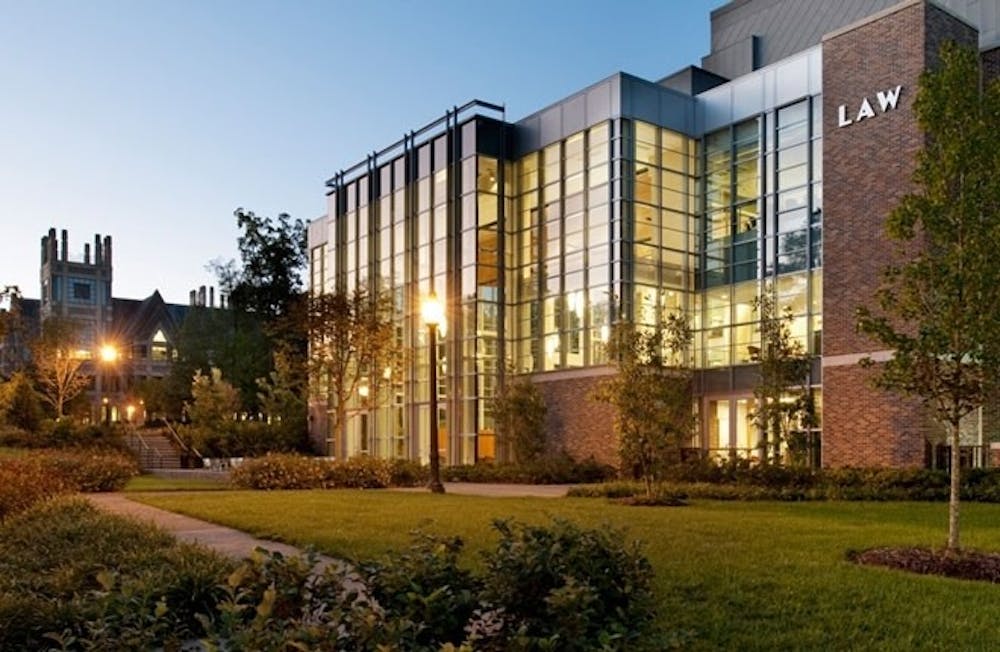In 2015, free speech activists at the University of South Carolina used images of a swastika displayed on another campus and a sign including the term "wetback"—a derogatory term usually aimed at undocumented Mexican immigrants—at a demonstration on campus to represent speech that had been quieted on other college campuses.
The school's actions in the wake of the protest have sparked a legal fight.
Now, Duke's First Amendment Clinic is weighing in on the fight, filing a "friend of the court" brief to ask the U.S. Supreme Court to hear the case.
The Clinic recently filed the amicus brief in the case Abbott v. Pastides. The brief was written by four third-year law students—Joe Bianco, Michael Fisher, Luke Morgan and Bryant Wright—under the supervision of H. Jefferson Powell, the clinic's director and a professor of law, and Nicole Ligon, the clinic's supervising attorney and a lecturing fellow.
“It was interesting to be able to pick and say what we think are the most important arguments from our perspective, not as representatives of the actual parties in the case, but as an outside party," Bianco said. "We are saying these are the things that are important to us and these are things we think the court should think about.”
The Clinic is not representing either party in the case. Instead, it filed the amicus—meaning “friend of the court”—brief as an outside party urging the Supreme Court to accept the case.
The First Amendment Clinic represents and advises parties who cannot afford lawyers that are First Amendment experts. The Clinic also provides legal analysis on legislation.
The situation began when student activists, including from the campus chapter of Young Americans for Liberty, held an event for free speech in which they displayed images that included a swastika and signs that included the phrase "wetback" on the campus of the University of South Carolina. The students' signs were based on speech that had been banned from other campuses.
An administrator sent a student organizer, Ross Abbott, a letter saying that other students had submitted discrimination complaints a day after the event, The State newspaper reported. The letter gave Abbott "five days to respond and directed him not to discuss the issue on campus or contact the students who had complained," according to The State. The State newspaper reported that the lawsuit claimed that this letter "was effectively a gag order."
Abbott and another organizer then met with an administrator for 45 minutes to discuss the event, according to The State. In late December 2015, Abbott was informed that the University was no longer looking into the matter.
Morgan, one of the Duke Law students who authored the brief, said that the activists shouldn't be punished for their rally.
“This is certainly a frivolous complaint because these terms weren't being used or the symbols weren't being shown in an attempt to discriminate or offend anybody at all," he said. "They were being used as an educational display about other free speech on-campus incidents, so there's this layer of irony on top of it.”
Morgan added that the speech code is being challenged because it doesn't require that the speech in question be "objectively offensive."
"In other words, if any person is offended, it might be a violation of the code, even if their taking offense is unreasonable from an objective standard,” Morgan said.
Aside from Duke Law's amicus brief, the Cato Institute joined the South Carolina chapter of the American Civil Liberties Union and others to file an amicus brief in support of the activists.
“The First Amendment, as much as it is seemingly political, should protect everyone's right to free speech and we feel very strongly about that," Ligon, the Clinic's supervising attorney, said. "Whether somebody is liberal or conservative, the First Amendment protects speech as a general matter, not just one side."
Get The Chronicle straight to your inbox
Signup for our weekly newsletter. Cancel at any time.

